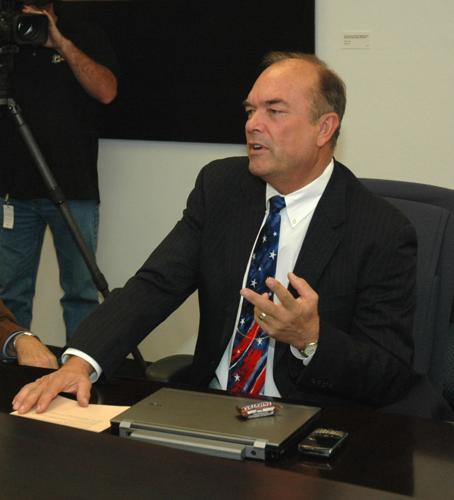PHOENIX — State lawmakers agreed Wednesday to ask voters to give the state’s electric companies pretty much what they want in setting rates on their customers who generate their own power.
On a party-line vote, the Senate Appropriations Committee voted to require state utility regulators to set separate rates for their solar customers from those who buy all their electricity directly from the power company. Sen. Debbie Lesko, R-Peoria, who admitted she got utility help in crafting the measure, said she sees HCR 2041 as ensuring solar customers pay their fair share of costs.
The proposed constitutional amendment does not prohibit the Arizona Corporation Commission from requiring utilities to purchase the excess electricity that homeowners and businesses generate. But it spells out that the utilities cannot be forced to pay anything more than wholesale costs, even as they may be selling it back to a next-door neighbor at retail rates.
And it specifically requires the commission, in setting rates, to minimize the costs on non-solar customers. Lawmakers did not stop there.
They also approved a separate constitutional proposal that would give the commission the power to regulate companies that sell and lease solar panels. And what’s in HCR 2039 includes the ability to determine the rates that are charged for the generated power.
Lesko insisted her measure, which would go to voters in November, did not originate with the power companies. Instead, she said, it is in reaction to an initiative drive being funded by SolarCity. The measure, also subject to voter approval, would prevent regulated utilities such as Arizona Public Service, Tucson Electric Power, UniSource Energy Services and a host of cooperatives from imposing “demand charges” on customers who generate their own power. That is an additional surcharge based not on the overall amount of energy used but the peak demand at any one time.
And it would require solar customers who generate more power than they use to be allowed to sell the excess electricity to the utility and get a credit for it at the same rate as what the utility would charge to sell it back to them.
Lesko said once she saw that initiative, however, she got together with utilities and others to craft a counter — HCR 2041.
The language of what she and the utilities produced is no coincidence. It not only represents what several of the utilities already are asking the commission to approve but in fact requires the elected panel to give them what they want: Higher charges on solar customers.
Barbara Lockwood, a vice president of Arizona Public Service, said the higher charges the utilities are trying to impose on solar customers are justified.
She told lawmakers the current rate structure already has resulted in a cost shift that will amount to $600 million in subsidies of customers who have rooftop solar by those who do not.
“That subsidy is growing today at a rate of almost $1 million a day,” Lockwood said. “It’s not insignificant, it’s not small, and it’s not fair to all customers that are here in Arizona.”
Lesko said although the language of her measure mirrors what the utilities want, it does not mean she’s just doing the bidding of electric companies.
“What I’m trying to do is protect the vast majority of the utility ratepayers which are non rooftop-solar customers,” she said. “So if that aligns me with the beliefs of the utility companies, then it does.”
The companion measure, also subject to voter approval in November, goes after the industry from a different angle, subjecting it to the same commission regulation as power companies. Sen. Don Shooter, R-Yuma, the sponsor of that, said the move is justified.
But Meghaen Dell’Artino, representing the industry-sponsored Alliance for Solar Choice, said that ignores important facts.
One, she told lawmakers, is that utilities are regulated by the commission because they are monopolies. Customers who live in their service areas have no choice but to purchase their power from the utility that serves the area; customers are free to buy or lease solar panels from any number of companies.
The other is that, by virtue of being a regulated monopoly, the commission has to set rates designed to give utilities a guaranteed rate of return on their investment. Dell’Artino said HCR 2039 would put the commission in the position of setting the prices that are now negotiated between solar companies and individual customers.
Sen. John Kavanagh, R-Fountain Hills, said if solar companies think that having the government set the price of power is a bad thing, then they should be opposed to the SolarCity initiative. That’s because that measure spells out that electric companies have to pay retail rates when they’re forced to buy excess power from customers with rooftop solar, something Lesko’s proposal would override.
It is impossible to separate these two measures from the SolarCity initiative. Sandy Bahr, lobbyist for the Sierra Club, said lawmakers are considering the two measures for only one reason: to “create confusion” at the ballot with three separate measures, all of which claim to be looking out for the interests of consumers.
The initiative drive designed to keep solar affordable has dubbed itself the “Arizona Solar Energy Freedom Act.”
Lesko has named her measure that would allow utilities to charge more to solar customers the “Solar for All Act.”
And what Shooter is sponsoring would go on the ballot as the “Solar Consumer Protection Act.”
The full Senate now needs to consider the two legislative measures.







